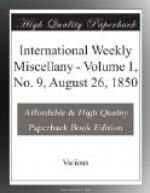of Christianity. The views and sentiments, the
aggregate of which make up the body of Christian opinion,
are not all of Jewish or Christian origin. They
are the moral creed of societies whose opinions and
civilization have been derived in part from other
sources. The philosophy of Greece and the law
of Rome have contributed in nearly equal proportions
to the theosophy of the Hebrews. The jurisprudence
of all Christian nations is mainly referable to Rome
for its origin, and the same is the case with at least
the Sunnite Mahometans. The nations of Islam took
only their religious creed from their Prophet; the
jurists of Kufah retained and expounded the civil
law which prevailed among them before his time.
That law was the law of the Greek Empire, developed
in the same way as that of the Western Empire under
the judicial and legislative auspices of Roman Praetors
and Pro-Consuls, aided by Roman jurists. Theophilus,
one of the jurists employed by Justinian for his compilations,
lectured in Greek on the Institutions; and the substance
of his lectures still survives under the name of the
Paraphrase of Theophilus. The Greek edicts and
novels of Justinian’s successors are mainly
Roman law. Throughout the Byzantine Empire (within
which Kufah and the region where Bagdad now stands
were included) Roman law was paramount, and Roman
jurists were numerous. The arrangement, the subdivisions,
and the substance of Mahometan jurisprudence, show
that it has been principally derived from this source.
Some of its doctrines are doubtless aboriginal engrafted
on the law of the Empire; and it has been modified
in some respects to reconcile it to the religious
dictates of Islam, just as the law of Pagan Rome was
modified after Christianity became the religion of
the Empire. But still Mahometan jurisprudence
retains undeniably the lineaments of its parentage.
This consideration places in a strong light the importance
of the study of Mahometan law. The increasing
intimacy of our relations with independent Mahometan
states makes it of the utmost consequence that we
should entertain correct views of their opinions and
institutions; and no better key to the knowledge of
both can be found than in the historical study of
their law. Again, we are called upon to legislate
and supply judges for British India, a large proportion
of the inhabitants of which are Mahometans. Even
the Hindoos of the former Mogul Empire have adopted
many legal forms and doctrines from their conquerors.
A minute and accurate acquaintance with Mahometan
jurisprudence is an indispensable preliminary to judicious
legislation for British India. For these reasons,
it could be wished that Mr. Baillie, or some other
equally accomplished laborer in that field, would
set himself to do for the “Futawa Alumgeeree”
what Heineccius and other modern civilians have done
for the law-books of Justinian—present
the European public with an elegant and exact abstract
of its contents.
* * * *
*




